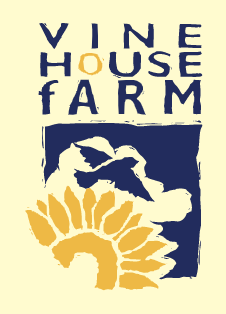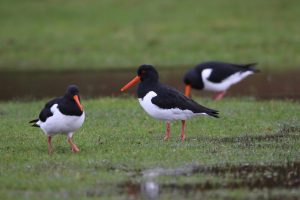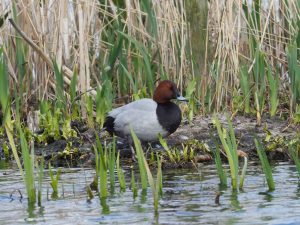
June has been a pleasant month, more sunshine than usual and less rain than usual. I have recorded just 16mm or 0.63 of an inch of rain. We have only had six warmer Junes in the last 50 years and they have all come in the last 20 years. The 50 year average being 15.05°C and this months average is 16.2°C.

Having drilled all the bird seed and planted all the potatoes, the men were not very busy so they had time to restore the Massey Ferguson 135 that I bought in 1975. I bought it because every time I went to the Royal Show at Stoneleigh to enter the National Tractor Handling competition the final was always held on a M-F, so I bought it to practice on and that year I came second and the following year I won the National Tractor Handling competition. I have kept the tractor as a memento, but it needed overhauling, so the men on the farm set about it and unknown to me they had it ready for my 80th birthday party on June 15th. They have done an excellent job.
Since then, the men have been busy irrigating. We’ve only had 38mm or 1.5 ins of rain over the past two months and above normal evaporation, because of above average sunshine. So, our ground, like most parts of the country, is getting very dry. Irrigating is not the most popular job on the farm as the irrigating machines must be moved every morning and evening, seven days a week. You could say it intrudes into your family life, but I say to the men spare a thought for the small dairy farmer, who milk cows twice a day, seven days a week, throughout the year.
We have also been rogueing our organic cereal crops. Most of them are grown for seed, for other farmers to plant; we get a premium for them if they are free of wild oats. It is a matter of walking up and down each field at 8-metre intervals – they are easy to spot in wheat or barley crops, but not so easy in oat fields. Oats make quite a good break crop – a break in the rotation. We are growing them for seed, porridge oats and oat milk.
We still have about 300 tons of wheat from last harvest to go away. Unfortunately, there has been a complete turnaround in the grain trade. A year ago, wheat was in great demand and now nobody wants it, so the price has returned to normal levels.
Potatoes are in great demand, and we still have 1000 tonnes of potatoes to go to McCains, to be made into chips for MacDonalds. They are on a contract, so a fixed price; that is how McCains like to do their business. The price they will be paying us will be about half of the free market price, but last year we also had a contract with them, and they were paying us double the free market price, so what you lose one year, you get back the next year. It will take us about five days to get these loaded on to trucks using three men and lots of machinery. This is a huge advance on 50 years ago, when it would have taken five men 75 days to do the job. Just think of all the men we used to employ on the farm and of course it is the same in every industry, it is a wonder that everyone who wants a job has a job.


The feeding frenzy in my garden is over, the Starlings have left the garden and have gone to the fields to feed on aphids. I’m sure the Blackbirds and all the smaller birds appreciate their departure.
People often ask me ‘should I still be feeding the birds at this time of year?’. The answer is that the birds will tell you when they don’t want feeding, as they will stop coming to your garden.
We have lots of young birds around, it seems to have been a good breeding season so far although the cold spell at the beginning of June would not have helped them.
Barn Owls are not having a good time in Lincolnshire this year, as there are very few voles around. Only half of the boxes I visit have an Owl in them, and less than half of those boxes have eggs or young. I have just one youngster three weeks old in a box and two more boxes with eggs. There were so many voles last summer, the adults had a second brood and the young stopped around and ate all the voles up. March was a bad month for them, as it was wet and windy, they could not hunt successfully, and I have never picked up so many dead Barn Owls as I have done this spring. Despite the dry weather vole numbers have not increased and so the majority of Barn Owls have not been able to get into breeding condition.
I make sure that there is a hole in all our grain sheds, so that the Owls have somewhere to go and look for mice on wet and windy nights. We don’t have a mouse problem in our grain sheds this year, because the Owls have been searching everywhere for food. They only need a 6ins x 6ins hole to get into a building.
Vole numbers will increase in the future at some point and then the Barn Owls will be able to breed again. I am not worried about the Barn Owl populations as they have always had these ups and downs. They have been able to bounce back successfully in the past 40 years that I have been monitoring them.
Tree Sparrows did not do too well on their first brood; they were laying five or six eggs but only rearing an average of two or three young. With it being a good June, they are now rearing five or six young.
I presume they were not rearing many in their first brood, because there were not many insects around. As the summer goes on, insect numbers increase until the end of July. During August, there is a sharp decline in the creepy-crawly stage of insects which the Tree Sparrows feed on. This means the only birds feeding their young on insects, after the end of August, are Swallows and House Martins as they are feeding their young on flying insects, the last stage of the insects’ life.
We still have a few Swifts in the village, but not as many as we used to. They nest in the 1935 built council houses. From my observations, it is not a lack of nesting sites causing Swifts to decline, it is a lack of insects, and that lack of insects is unfortunately affecting our wild bird populations all over the country. I see no way of increasing insect numbers countrywide.



